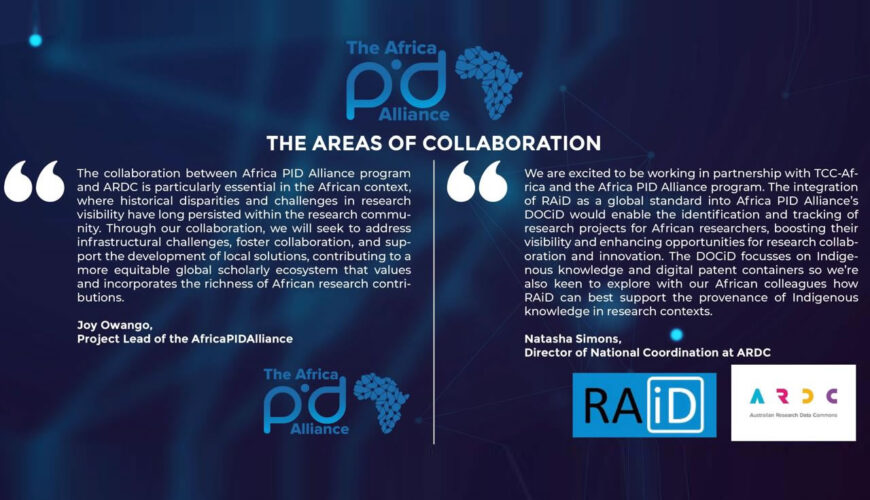Bridging technology through partnership: ARDC partners with Africa PID Alliance Program of TCC- Africa
Draft: Natasha Simons, 3 October 2025
[Note: we could include a photo of Joy Owango that I took at PIDfest – see below]
On 30 September 2024, a Memorandum of Understanding (MoU) was signed between the ARDC and the Training Centre in Communication (TCC-Africa) outlining collaborative efforts between the 2 organisations in the area of Persistent Identifiers (PIDs).
Headquartered at the University of Nairobi in the Republic of Kenya, TCC-Africa is dedicated to advancing PID usage across Africa. It shares a common goal with ARDC to improve the visibility of research processes and the connections between research components through partnerships and linking of PIDs. Under their Open Infrastructure Program, the Africa PID Alliance (APA) is a key initiative driven by TCC-Africa and encompasses a community of PID enthusiasts in and from Africa. TCC-Africa is facilitating the provision of PIDs for Patent Data, Traditional Knowledge, and Cultural Heritage through its Digital Object Container Identifier (DOCiD).
As Australia’s national digital research data infrastructure provider, the ARDC offers a range of PID services free of charge to the Australian research sector and is the Australian DataCite DOI Consortium Lead Organisation. ARDC is the global Registration Authority for RAiD, an ISO standard PID that makes information about research projects visible, portable, and complete in the service of research integrity, efficiency, and transparency.
Areas of collaboration between ARDC and Africa PID Alliance include:
- enabling access to RAiD amongst the APA community and in Africa more broadly through a potential RAiD Registration Agency in the region
- exploring the integration of RAiD into Africa PID Alliance’s DOCiD and other APA systems and services
- strengthening technical capacity through knowledge sharing around best practices on PID production and management
- improving awareness of RAiD and encouraging uptake of open PID infrastructure through the use of RAiD amongst researchers and organisations in Africa to link research organisations, contributors, funding, infrastructure, data, software, publications and other research inputs and outputs, as well as facilitate public access to this research project information
- investigating the ways in which RAiD can help to record the provenance of Indigenous knowledge in research contexts.
ARDC and Africa PID Alliance will engage in regular strategic conversations at the leadership level to progress the areas of collaboration and explore further partnership possibilities. The outcomes will enable greater visibility, linking and tracking of African research in a global context whilst preserving cultural heritage and indigenous knowledge.
Joy Owango, Founder of TCC-Africa, said “The collaboration between Africa PID Alliance program and ARDC is particularly essential in the African context, where historical disparities and challenges in research visibility have long persisted within the research community. Through our collaboration, we will seek to address infrastructural challenges, foster collaboration, and support the development of local solutions, contributing to a more equitable global scholarly ecosystem that values and incorporates the richness of African research contributions”.
Natasha Simons, Director of National Coordination at ARDC, said “We are excited to be working in partnership with TCC-Africa and the Africa PID Alliance program. The integration of RAiD as a global standard into Africa PID Alliance’s DOCiD would enable the identification and tracking of research projects for African researchers, boosting their visibility and enhancing opportunities for research collaboration and innovation. The DOCiD focusses on Indigenous knowledge and digital patent containers so we’re also keen to explore with our African colleagues how RAiD can best support the provenance of Indigenous knowledge in research contexts.”
Joy Owango speaking at PIDfest 2024 in Prague (photo by Natasha Simons)
The ARDC is enabled by the National Collaborative Research Infrastructure Strategy (NCRIS) to support national digital research infrastructure for Australian researchers.
Written by Natasha Simons, ARDC. Reviewed by REVIEWER (ORGANISATION), REVIEWER (ORGANISATION).
ENDS
Words: (500-700 words are recommended)
Publishing details
| Images | As above |
| Image caption(s) | Joy Owango speaking at PIDfest 2024 in Prague (photo by Natasha Simons) |
| Image alt text | |
| Article excerpt | The ARDC and ARDC and the Training Centre in Communication (TCC-Africa) have signed an MOU to collaborate on Persistent Identifiers (PIDs). |
| Article meta description | The ARDC and ARDC and the Training Centre in Communication (TCC-Africa) have signed an MOU to collaborate on Persistent Identifiers (PIDs). |
| Article link | |
| Social media posts | |
| Twitter post #1 | |
| Twitter post #2 | |
| Twitter handles & hashtags to include | https://twitter.com/tccafrica , https://x.com/AfricaPid
|
| LinkedIn post #1 | |
| LinkedIn Organisations to tag | https://www.linkedin.com/company/training-centre-in-communication?trk=public_profile_topcard_current_company The Africa PID Alliance |
| ARDC website | |
| Africa PID Alliance website | www.africapidalliance.org |
| Training Centre in Communication | www.tcc-africa.org |
| Related ARDC pages – eg. articles, projects, programs, case studies… | |
| ARDC website pages to update |
Quote to be confirmed by Joy

